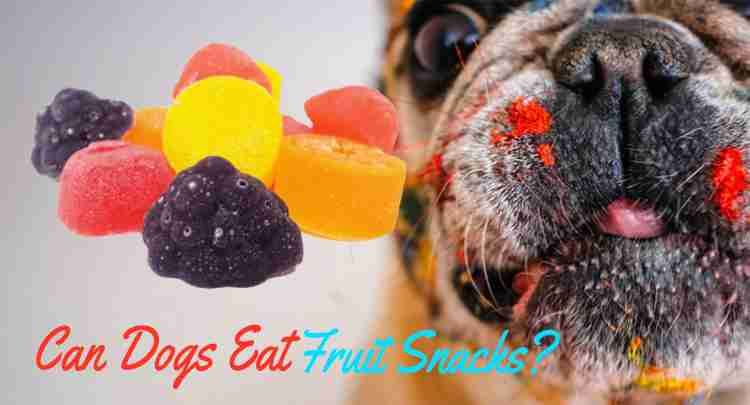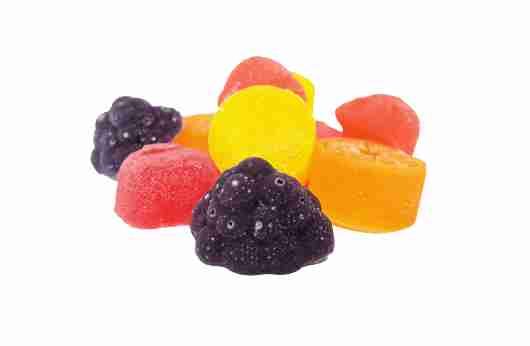Fruit snacks are delicious, but they’re not very good for dogs! Some fruity snacks have been recalled due to hazardous levels of poisonous ingredients. So, read the label and only feed your dog-approved fruit snacks.
Can dogs eat fruit snacks? Yes, dogs can eat fruit snacks. They can eat almost anything that you or your children eat. However, there are some downfalls to giving your dog junk food.
Dogs need way fewer calories than humans. Plus, the chemicals in many commercial snacks and human foods may pose health risks to dogs, such as wheat and dairy allergies.
Can dogs eat fruit snacks?

The answer to that is yes. However, not all fruit snacks are healthy for your furry friend. Fruit snacks come in all sorts of shapes and sizes, and many brands have added chocolate, nuts, and other undesirable ingredients.
While gummy fruit snacks are not harmful, they are high in sugar, which can cause some health issues for your dog.
Can dogs eat welch’s fruit snacks? Yes, dogs can eat fruit snacks. But you should know a few things before you feed your dog welch’s fruit snacks. First, these snacks are just like potato chips or cookies.
They are not meant to be everyday food and are not meant to replace any meals. Next, these snacks are typically sweet. So, if you don’t like sticky sweet snacks, don’t feed your dog fruit snacks. Fruit snacks are more of a treat than part of a diet.
What are fruit snacks?
Fruit snacks are little pieces of Fruit put into little pieces of sugar. Fruit snacks are marketed as a healthier alternative to candy (or, you know, just candy), and while they may be healthier than candy, they’re not exactly good for your waistline. And they’re certainly not “healthier” than real Fruit.
Fruit snacks used to be called fruit roll-ups. That’s still the official name, even though most manufacturers now call them “fruit snacks.” Their original flavor is orange, and to this day, you can buy them in any supermarket.
You can also buy them online from retailers like Amazon. They’ve been around for a while, but only recently have people started really noticing them.
How is a fruit snack made?
Fruit snacks are fruit-flavored candies made mostly of corn syrup. These treats are common after-school snacks and are often given to kids at parties.
They are made by many brands, including Brach’s, Nestle, and Fruit by the Foot (Fbft). These fruity snacks are also sold in bags that can hold multiple servings.
Most fruit snacks are popular, convenient snacks for children. Fruit snacks are made with real fruit juice and Fruit, but no added sugars. They come in a variety of flavors, including apple, cherry, grape, orange, peach, pineapple, and strawberry.
Some gummy fruit snacks are a healthy alternative to other sugary snacks, but how much Fruit is really inside? Fruity snacks provide all the benefits of Fruit with the added benefit of being deliciously sweet.
Popular fruit snacks include:
- Sunkist Fruit Rolls
- Fruit Gushers
- Fruit Roll-Ups Fruit Bites
- Sunbelt Gummy Candies
The other main ingredients are corn syrup, pure sugar, modified corn starch, Vitamin E, Vitamin C ascorbic acid, citric acid, sodium citrate, gelatin, and other artificial flavors. Consider getting other fruit snack alternatives that provide health benefits with natural fruit flavors.
Some of those ingredients are harmful to your dog’s health. The fruit purees used in making fruit snacks often lack the key ingredients that would identify them as fruits. They lack the dietary fiber that is required in a regular dog’s diet.
When was the fruit snack invented?
Fruit snacks were invented by Mars, Inc. in 1958 and are considered novelty candies with a chewy texture. The inside of each colorful pouch is filled with fruit juices and gelatin. Fruit snacks are not particularly healthy and high in sugar and fat, but they do offer a 40 percent serving of Fruit.
Fruity snacks are a snack made from dehydrated Fruit—usually Fruit that has been cut into small bite-size pieces. The pieces are then coated in sugar, flour, and other flavorings.
That might not sound like a very nutritious snack, but fruit snacks aren’t just for kids. They’re also popular with adults, who eat them as snacks during the day.
When did the fruit snack become so popular?

Fruit snacks have become popular in recent years, especially among kids. But what exactly are fruit snacks, and where do they come from?
A fruit snack is a snack in the form of a fruit roll-up. They may contain a variety of fruits, such as dried apricot, dried apple, and strawberry.
Fruit snacks are a popular snack enjoyed by kids and adults alike. Fruit snacks are a variety of chews, which are chewy fruit snacks that are often flavored.
They are often made of real pieces of Fruit and are sometimes made with fruit juice or puree. Fruit snacks can be eaten on their own or used in recipes.
Fruit snacks are popular for kids, but adults also love them. They tend to be shaped like little pieces of Fruit and come in flavors like apple, banana, peach, and grape. This makes them a fun snack to munch on by the pool or in summer camp.
But what most people don’t know is that fruit snacks aren’t actually fruits. Instead, they’re made from fruit puree, and they’re among the lowest-calorie snacks out there.
Is eating fruit snacks bad for dogs?
Dogs love eating fruit snacks, and it’s no wonder: they’re crunchy, tasty, and packed with sugar. But are the fruit snacks bad for dogs, or are they just a win-win for everyone?
Dogs love fruit snacks. But is Fruit a snack that dogs can safely eat? The short answer is yes. But, while it’s safe for dogs to eat fruit snacks, they do have to be eaten in moderation.
Plus, if your dog has a history of stomach problems, you should consult your veterinarian about whether the fruit snacks are okay.
Is eating fruit snacks bad for dogs? It seems like a simple question, but the answer isn’t so simple.
While many fruits, including bananas, apples, berries, pears, and oranges, are good for your dog, some fruits should be avoided. Dog treats are bad for dogs. The only good thing about them is that they keep dogs happy.
I like to give my dog some cheese, not those dog treats, but real cheese. What if I told you there is something better? Something that not only keeps your dog happy but also keeps its teeth clean, keeps its skin healthy, and helps keep its mind sharp?
Nutritional benefits and effects of fruit snacks on dogs
The effects of fruit snacks on dogs can be harmful to their overall health. Fruit snacks have been known to contain high calorie, fat, and carbohydrate content. This can encourage excess weight gain in a matter of months.
The sugar in fruit snacks can also cause teeth and gums to decay and encourage dental disease. Fruit snacks are a guilty pleasure for children and adults alike, but what happens when you give a fruit snack to your dog? The simple answer is that some fruit snacks can be toxic to dogs.
Any rotting fruit or vegetable that isn’t cooked or canned will cause intestinal irritation if your dog swallows it. The symptoms will manifest as vomiting, diarrhea, and abdominal pain.
Many people like to give their dogs special treats—especially during the holidays. While those treats seem like a good idea at the time, they can prove dangerous to your dog.
Fruit snacks, particularly raisins, are very dangerous for dogs. The sugar in fruit snacks can cause dogs to get upset stomachs, which can be very serious. While there are plenty of other dangerous treats you can give your dog, fruit snacks are at the top of that list.
Disadvantages when a dog eats fruit snacks
Fruit snacks are delicious, but your dog may think they are too. The sugar, calories, and artificial flavoring found in many fruit snacks can cause dogs to have diabetes, diarrhea, constipation, obesity, and nervousness, among other problems.
If Fido is partaking in too many of these treats, consider giving a few less to him each day. Motts fruit snacks and fruit leathers are favorite snacks for many dogs.
However, fruit snacks can also be very dangerous to dogs. Fruits and vegetables that are low in fiber or high in sugar can lead to serious health problems in dogs.
Not only can they harm your dog’s teeth, but sugar can lead to diabetes, which can affect the dog’s eyes, kidneys, heart, and nervous system. The added sugar and artificial sweeteners can cause dental problems and upset stomachs.
Dogs are picky about what they eat, and it’s important to know what foods to avoid when feeding your canine companion. In particular, some popular “treats” for dogs—like fresh fruit snacks with concentrated grape juice —are so unhealthy that they actually do more harm than good.
Can fruit snacks cause health problems?
If your dog loves fruit snacks, you know the signs of having too many. Skin issues, stomach problems, anxiety, and urinary problems are not uncommon in conjunction with a diet high in carbohydrates, such as fresh fruit snacks.
Dogs should also be monitored regularly for signs of diabetes, especially those that are over seven years old. The signs of diabetes include increased water consumption, increased urination, and increased appetite.
Fruit snacks are a tasty treat that often sends kids into a frenzy of munchies. However, many fruit snacks also contain sugar, which can be harmful to dogs. While dogs can eat Fruit, too much sugar can cause health issues, including weight gain, obesity, diabetes, and pancreatitis.
Dogs fruit snacks are a favorite snack for many dogs, but are they safe?
Too many fruit snacks can cause your pooch diarrhea or tummy ache. While dogs shouldn’t eat these snacks like treats, they can certainly enjoy them in moderation. However, it’s important to remember that these aren’t exactly healthy snacks.
Avoid giving your puppy fruit snacks containing grape juice concentrate, as these substances are toxic to dogs. The American Kennel Club warns dog owners that grapes can cause sudden kidney failure, no matter the amount is eaten.
Fruit concentrates are made by removing all the water from fresh juice. This means that they have a higher sugar content than most fruits because the water has been removed. Plus, refined sugar is obtained from Fruit concentrates such as grape or apple puree concentrate.
Can dogs have fruit snacks? Look for healthy alternatives, give your pet regular dog food, and limit the other snacks to once a week. There is really no nutritional benefit when it comes to these snacks. Avoid feeding your dog to prevent an upset stomach.
Last Updated on 16/03/2025 by Karen Snow
Hi! I’m Karen and a certified dog lover. As a freelance writer and blogger, I do my best to squeeze in some time with my dogs, learning more about the way they act and how I can make sure that they continue to stay well-cared for by yours truly.
My dogs have helped me through a lot, and this is my way of giving back to them! Besides animals, I also love to travel and cook, having explored my country’s restaurants and unique places. Follow me as I show you all the amazing tips and bits of information I learn along the way about our furry friends!
